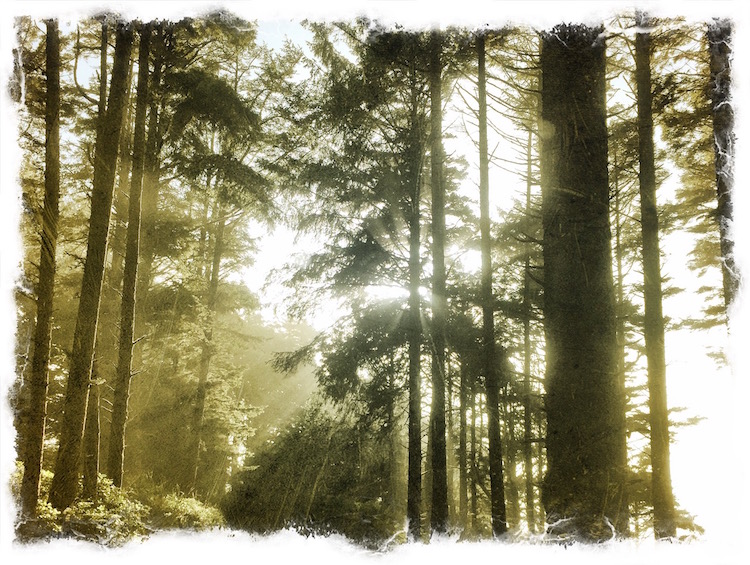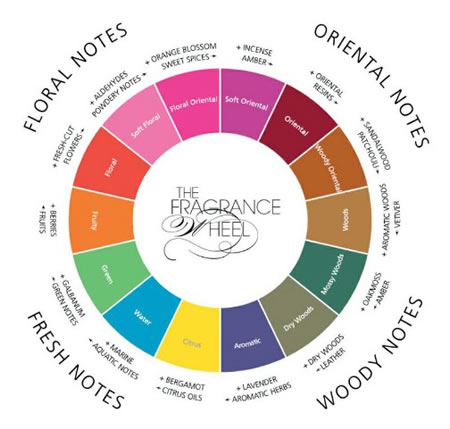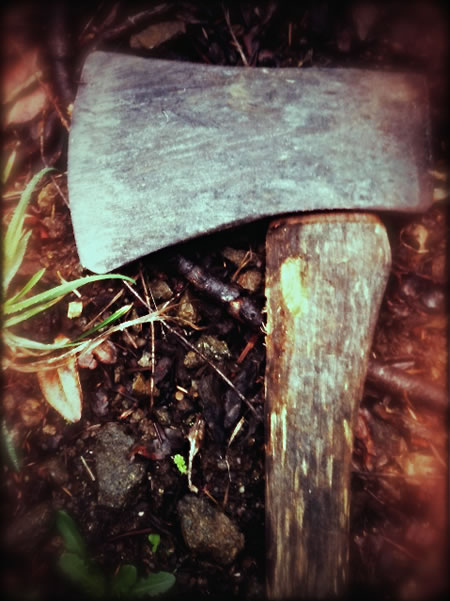
AND THE PERFUME OF ITS MAKING
THE DARK RESINS OF FIRE AND WOOD — AND THE TRANSFORMATIONS OF PITCH, BURNING, ASH AND THE INCENSED DUST OF FRAGRANCE.

I live and dream in the forest — an old sitka grove out on the coast, washed in fog from the sea. Perfume is a way of life – the smelling of the boulevards of living.
Scents as evocations — the voice of the object and the emanation of its story.
I split big woods — massive logs of sitka, iron-hard timbers of red-skinned madrona, dry bolts of hemlock fir. I see it as a large-scaled calligraphic movement: have a portfolio of axes — from doubleheader blades to single splitters, to hand axes and light wrist-wielded blades for splintering logs to kindling — and then giant adze splitters for breaking pitch glued logs.
It’s a meditation — the swing of an axe is a precise calligraphic stroke. Set the blade, begin the catalyzing arc, wield downwards in a power convergence on the head grain of the stock, like a releasing calligraphic initiation stroke, starting a letter, it begins, it splits. And the story of the scent comes forth.
I contemplate the splitting wood — cracking open the fragrances with an old axe or a sparkling new iron made razor cleaver. The fast-moving metal, striking wood, has a scent: Iron perfume.
Burning the wood in my studio stove, I can scent the smell of the wood transposing my living place — into the smoky vapor of fragrant smoke, wafting into the room. That fumerie sets a seasoning of fragrance, over years of smoke-laying.
Splitting different woods, I note the variations in flavor. The wet wood has a different scent note than another; cedar cracked splinters another tint of perfume, dry woods, old and rotten timbers, straight and crisp pine — the grain shows another layering. The cool hardness of Madrona splits another wafting — greener, dense, just like the red-skinned wood itself. It burns bitter but densely hot. To each of these there are characteristics that speak to the heart of the wood, what it means in the ecosystem and the layering of its messages in the form of its molecular phrasing of fume. Forests as portfolio — even the breeze through tells another story for the artful “listener” to fragrance.
That makes me ponder the nature of wood in the category of perfume — the ancient legacy, the incense of woods. The oldest fragrances of the world are incense-based — ointments and pastes, ground woods, spices and herbs, melded into a powered dusty element that burns and, like pro fumo, the scent passes through.
Personally, in the quest for scents, there are notes that underlay the density of the male scent place — and these are the woods and grasses that speak to me. In a way, I wonder about the psychic link to scent attractions – what draws us to certain fragrance experiences; scents that we’re willing to deliberately infuse in the places that we live in, or mist on our bodies? But others repel? That might lie in the foundation of memory — scents that we savor evince attractive sensitivities to the past.
That link to the nature of wood — the split scent of its heart — and the smoke of its burning; it’s a powerful mnemonic for many. Offering a small vial of birch tar to someone — to sample; her reaction was immediate. But it wasn’t a “nice perfume.” It was a instant retelling of her experiences: camping, being in the mountains, campfires and storytelling. It took me years to find that note — the scent of Birch Tar. The recalled notations came rushing — and tellings were quickened and immediate. The power of the wood — and the burning smoke of its transformation — are deeply evocative of ancient spaces, perhaps places that people have been in, tens of thousands of years, speaking to their deep, psychic and experiential link.
I am no expert in the place of perfume — but, like others, have been studying it for years. I feverishly collect and align built fragrances, essential materials, oils and ingredients and note their impressions and meaning.
I cannot, however, consider the science beyond that poetry. What captivates me — the enchantment of perfume — is the alchemy of its nature; it’s partially about molecular alignments, sequences of complexity that lend themselves to deep memory and the notation of being; the artfulness of the levels of these archaeological strata of ingredients. And it’s about the intuitive artistry of the builders — the noses — compiling hundreds of ingredients to empower a symphony for the impressionable nose. That being: you. As I’ve noted, there are specific places that I look, relationships to essences that are enchanting. Others are less relevant — or sensually resonant.
Wood is one of them — the sound of that scent, rings truth.
Comments on wood, shored with the deeper investigations of others, follow. First, the overview — what are the woods? For the uninitiated, there are these openings:
Wood, the notation from Wiki quickly offers —
Wood: Fragrances that are dominated by woody scents, typically of agarwood, sandalwood and cedarwood. Patchouli, with its camphoraceous smell, is commonly found in these perfumes. A traditional example here would be Myrurgia‘s Maderas De Oriente or Chanel Bois-des-Îles. A modern example would be Balenciaga Rumba. Musk would also fall somewhere near this category
Some notes on the front of wood types, to those that haven’t studied the modeling, there is a spherical framing of fragrance. This ideation comes from the analytical offering of Michael Edwards, a fragrance strategist that originated his theories of scent structuring in 1983. This appellation expands in the addition of more modernist constructions. Still, the wood notes remain the same — timeless, as ever.

Michael Edwards | Fragrances of the World
This appellation expands in the addition of more modernist constructions. Still, the wood notes remain the same — timeless, as ever. Osmoz notes expanded details, below, in their study of wooded materials for fragrance development.
Wood
This great olfactive family is characterized by Virginia cedar, Gaiac wood, pine essence, patchouli, sandalwood, and vetiver.
 Oak (Quercus Robur)
Oak (Quercus Robur)Category: Wood
Location: Encyclopedia
Woody, woodsy, barky, dry, smoky, liqueur-like, dry fruit, vanilla.
 Hinoki (Chamaecyparis Obtusa)
Hinoki (Chamaecyparis Obtusa)Category: Wood
Location: Encyclopedia
woodsy, cedar, pine, balsamic, camphor.
 Vetiver (Vetiveria Zizanoid)
Vetiver (Vetiveria Zizanoid)Category: Wood
Location: Encyclopedia
Woody, earthy, root, smoky, lingering.
 Sandalwood (Santalum Album)
Sandalwood (Santalum Album)Category: Wood
Location: Encyclopedia
Woody, oriental, powdery, milky, very persistent.
 Patchouli (Pogostemon Patchouli)
Patchouli (Pogostemon Patchouli)Category: Wood
Location: Encyclopedia
Woody, camphorated, green, earthy, moss, mildew.
 Guaiacum (Bulnesai Sarmienti)
Guaiacum (Bulnesai Sarmienti)Category: Wood
Location: Encyclopedia
Woody, balsamic, smoky. Read On >
 Balsam Fir (Abies Balsamea)
Balsam Fir (Abies Balsamea)Category: Wood
Location: Encyclopedia
Woody, balsamic, fruity, turpentine.
 Camphor (Cinnamomum Camphora)
Camphor (Cinnamomum Camphora)Category: Wood
Location: Encyclopedia
Strong, revitalizing and medicinal.
 Cedar (Juniperus Virginiana)
Cedar (Juniperus Virginiana)Category: Wood
Location: Encyclopedia
Woody and dry, newsprint, the smell of pencils.
 Amyris (Amyris Balsamifera)
Amyris (Amyris Balsamifera)Category: Wood
Location: Encyclopedia
Woody, sweet, redolent of sandalwood and cedar.
There are other levels to the story of wood, examining applications. Friends at the Perfumed Court, a sampling group, create arrays of selected perfumes which are organized to respond to type, some references are noted below. This grouping allows for a referral to specific offerings. Some in the trade challenge the notion of sampling, since the idea of buying tinctures of brands, potentially obviates purchasing fully branded and packaged bottles. But, for any student of the delicacies of studies of the perfumed arts, it’s one of the only ways to find products that are resonant. The issue, in the study of woods as odoriferous elements, is that one, there are many woods, and multitudinous offerings that utilize this series of ingredients.
Other shops, perfumers and collections will offer the sorting of fully branded expressions as search criteria, which is one of the other ways that I’ll organize scent character studies.
To wit:
• Ausliebezumduft.de
• LuckyScent
• Osmoz
• FragranceNet
• IndieScent
• Parfum1[men]
• The Perfume Shoppe
Seasons, places, recollections…the concept of scent, experience, memory and the forest.
While the wind wafts through the warming trees, or the iced and salted scent of the sea comes rushing up from the waves on stone through the groves, the orchard sways in the burgeoning of green fruit and heat, or the mountainous gnarled pines speak the legacy of centuries — to each, there is a fragrance.
As the wood is cut, dried, split, burnt — the evocations of these places are called forth. And as it has been for thousands of years, that scenting recalls ancient treasures and heritage linked to the mind of humankind and the memories of the experiencer, gifts of the forest. Reach in, reach back, reach deep.
TIM | GIRVIN | THE WATERFRONT STUDIOS
––––
LUXURY: BEAUTY & PERFUME BRANDING | EXPERIENCE DESIGN + PACKAGING
STRATEGIES | BRAND, STORY & SCENT
http://goo.gl/xq9vhy



